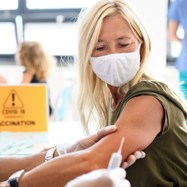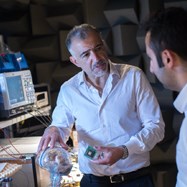UCL - Developing lifesaving COVID-19 technology at pace
A consortium led by critical care doctors and engineers from UCL and UCL Hospitals (UCLH) designed and mass manufactured a non-invasive breathing support device in just one month to help Covid patients.
This device, known as Continuous Positive Airway Pressure (CPAP), has proved critical in helping COVID-19 patients with serious lung disease improve their blood oxygen levels and save lives. The team innovated, reverse-engineered, tested and mass-manufactured a breathing aid at breakneck speed to help the global fight against COVID-19.
While CPAP devices were used extensively in hospitals in Italy and China in early 2020, they were in very short supply in UK hospitals. In response, the engineers and clinicians teamed up with Mercedes-AMG High Performance Powertrains, who design and build engines for Formula-1 cars, to redesign an out-of-patent CPAP device. Volunteer testing on a replica device, named the “UCL-Ventura” CPAP, began within 100 hours of the first meeting and UK regulatory approval followed within a week. A Mark II version that considerably decreased oxygen usage was then approved. The Department of Health and Social Care commissioned 10,000 devices which were built and delivered by mid-April 2020, just a month after idea conception. Devices were then sent to more than 130 NHS hospitals.
This coincided with a marked shift in clinical practice across the UK with far greater use of CPAP as hospitals recognised this was both an effective strategy that saved lives and spared stretched intensive care resources for the most critically ill COVID patients. The multicentre UK RECOVERY Respiratory Support trial reported a 19% reduction in use of invasive ventilation and 13% mortality reduction in patients receiving CPAP compared to face mask oxygen.
Contributing to the international humanitarian effort, UCL Business’s technology transfer experts supported release of full design and manufacturing instructions through a zero-cost license to establish local manufacturing hubs globally. Designs have been downloaded over 2000 times across 105 countries. The UCL team have supported local manufacture, testing, regulation and training, with at least 24,000 devices manufactured by other teams. UCL-Venturas are now helping to save lives in over 25 countries including Peru, Mexico, Palestine, Uganda, Pakistan, India, South Africa and Ecuador. The UK Government has also sent almost 1300 devices as part of emergency supplies to India and Nepal to combat surges in cases.
-
Hamir Patel
hamir.patel@russellgroup.ac.uk
020 3816 1316
-
Adam Clarke
adam.clarke@russellgroup.ac.uk
020 3816 1302
 X
X


